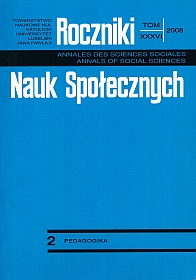Common Good as the Aim and the Criterion of Social Life – the Pedagogical Aspect
Abstract
In the light of the realist tradition, human life taken integrally, i.e. as a unity of three orders: vegetative, sensitive and rational, constitutes the common good and at the same time the aim and criterion of social life. The life of a hic et nunc man is a common property, as it is an individual aim of each and every individual man, and at the same time of all the people living in a given community. Educating one for implementing the common good is, firstly, transmitting to him, or to her, the knowledge about who a human being is, and about the fact that life of each man of the community is part of the common good of social life; and secondly, it is practicing virtues, or consolidating the disposition to implement the good, first of all the proper good (bonum honestum), but also taking care of the superior goods (bonum utile and bonum delectabile).
Personalistic pedagogy points out that existence of the common good is a necessary condition of practicing pedagogy as the theory of education and as practical upbringing. This pedagogy is based on the truth about the human being, and it takes his life (understood integrally) as the common good.
Copyright (c) 2008 Roczniki Nauk Społecznych

This work is licensed under a Creative Commons Attribution-NonCommercial-NoDerivatives 4.0 International License.


